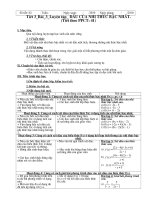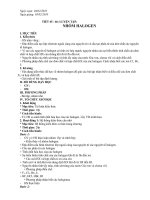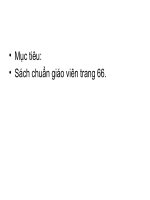Bài giảng Luyện tập AV8, 9 Tập 28
Bạn đang xem bản rút gọn của tài liệu. Xem và tải ngay bản đầy đủ của tài liệu tại đây (114.86 KB, 5 trang )
Relatives: defining, non-defining and connective
Combine the following pairs or groups of sentences by means of relative pronouns,
making any changes necessary.
1 You sent me a present. Thank you very much for it. (Thank you very much for….
………………………………………………………………………………………………
2 She was dancing with a student. He had a slight limp. (two ways)
……………………………………………………………………………………………………………
3 I am looking after some children. They are terribly spoilt, (two ways)
……………………………………………………………………………………………….
4 The bed has no mattress. I sleep on this bed. (The bed 1. . .)
……………………………………………………………………………………………………………
5 Romeo and Juliet were lovers. Their parents hated each other
…………………………………………………………………………………………….
6 There wasn't any directory in the telephone box. I was phoning from this box.
……………………………………………………………………………………………..
7 This is Mrs Jones. Her son won the championship last year.
………………………………………………………………………………………………
8 I was sitting in a chair. It suddenly collapsed. (The chair . . .)
……………………………………………………………………………………………………………
9 Mr Smith said he was too busy to speak to me. I had come specially to see him.
………………………………………………………………………………………………
10 The man was sitting at the desk. I had come to see this man.
………………………………………………………………………………………………
11 I missed the train. I usually catch this train. And I had to travel on the next. This was
a slow train. (Make into one sentence.)
……………………………………………………………………………………………………………
12 His girl friend turned out to be an enemy spy. He trusted her absolutely.
………………………………………………………………………………………………
13 The car had bad brakes. We were in this car. And The man didn't know the way. This man
was driving. (Make into one sentence.)
……………………………………………………………………………………………………………
14 This is the story of a man. His wife suddenly loses her memory.
………………………………………………………………………………………………
15 We'll have to get across the frontier. This will be difficult.
………………………………………………………………………………………………
16 A man brought in a small girl. Her hand had been cut by flying glass.
………………………………………………………………………………………………
17 The car crashed into a queue of people. Four of them were killed.
………………………………………………………………………………………………
18 The roads were crowded with refugees(ng ười tị nạn). Many of them were wounded.
………………………………………………………………………………………………
19 I was waiting for a man. He didn't turn up. (The man. . .)
………………………………………………………………………………………………
20 Tom came to the party in patched(chắp vá) jeans. This surprised the other guests. Most of the
other guests were wearing evening dress.
……………………………………………………………………………………………..
21 The firm is sending me to York. I work for this firm. (The firm. . .)
………………………………………………………………………………………………………….
22 The Smiths were given rooms in the hotel. Their house had been destroyed in the explosion.
…………………………………………………………………………………………….
23 I saw several houses. Most of them were quite unsuitable.
…………………………………………………………………………………………….
24 He wanted to come at 2 a.m. This didn't suit me at all.
……………………………………………………………………………………………..
25 This is a story of a group of boys. Their plane crashed on an uninhabited island.
………………………………………………………………………………………………
26 They tie up parcels with string. This is so weak that the parcel usually comes to pieces
before you get it home. (The string . ..)
………………………………………………………………………………………………
27 He introduced me to his students. Most of them were from abroad.
………………………………………………………………………………………………
28 He expected me to pay £2 for 12 eggs. Four of the eggs were broken.
………………………………………………………………………………………………
29 He spoke in French. But the people didn't know French. He was speaking to these people.
(Combine these last two sentences only.)
……………………………………………………………………………………………………………
30 The boy was a philosophy student(sinh vien hoc tâm lí) and wanted to sit up half the night
discussing philosophy. Peter shared a flat with this boy. (two ways)
……………………………………………………………………………………………………………
31 They gave me four very bad tyres. One of them burst before I had driven four miles.
………………………………………………………………………………………………
32 She climbed to the top of the Monument to see the wonderful view.
She had been told about this view.
………………………………………………………………………………………………
33 I was given this address by a man, I met this man on a train.
………………………………………………………………………………………………
34 The bar was so noisy that I couldn't hear the person at the other end of the line. I was
telephoning from this bar.
………………………………………………………………………………………………
'
35 A man answered the phone. He said Tom was out.
……………………………………………………………………………………………
36 The horse kept stopping to eat grass. I was on the horse. This (his continual stopping)
annoyed the riding instructor.
……………………………………………………………………………………………….
Relatives: non-defining and connective
Combine the following pairs or groups of sentences, using relative pronouns.
1 Tom had been driving all day. He was tired and wanted to stop.
…………………………………………………………………………………………….
2 Ann had been sleeping in the back of the car. She felt quite fresh and wanted to go on.
……………………………………………………………………………………………
3 Paul wanted to take the mountain road. His tyres were nearly new.
……………………………………………………………………………………………
4 Jack's tyres were very old. He wanted to stick to the tarred road.( đ ường nhựa)
……………………………………………………………………………………………
5 Mary didn't know anything about mountains. She thought it would be quite safe to climb
alone.
…………………………………………………………………………………………….
6 He gave orders to the manager. The manager passed them on to the foreman.(giám đốc)
……………………………………………………………………………………………..
7 She said that the men were thieves. This turned out to be true.
………………………………………………………………………………………………
8 The matter was reported to the Chief of Police. He ordered us all to be arrested.
………………………………………………………………………………………………
9 In prison they fed us on dry bread. Most of it was mouldy.(mốc)
………………………………………………………………………………………………
10 We slept in the same room as a handcuffed(cùm tay) prisoner. His handcuffs rattled every
time he moved.
……………………………………………………………………………………………..
11 We lit a fire. It soon dried out our clothes.
…………………………………………………………………………………………….
12 They rowed across the Atlantic. This had never been done before.
……………………………………………………………………………………………..
13 The lorry crashed into a bus-load of schoolchildren. Six of them were slightly injured.
…………………………………………………………………………………………….
14 She refuses to use machines. This makes her work more arduous.(= dificult)
…………………………………………………………………………………………….
15 I met Mary. She asked me to give you this.
………………………………………………………………………………………………
16 The women prayed aloud all night. This kept us awake.
………………………………………………………………………………………………
17 The river bed is uneven(gồ ghề) and you may be in shallow water one moment and in deep
water the next. This makes it unsafe for non-swimmers.
………………………………………………………………………………………………
18 Mary said that there should be a notice up warning people. Mary's children couldn't swim.
………………………………………………………………………………………………
19 Ann said that there were far too many notices. Ann's children could swim very well
……………………………………………………………………………………………....
20 He paid me £5 for cleaning ten windows. Most of them hadn't been cleaned for at least a
year.
………………………………………………………………………………………………
21 Jack the goalkeeper, and Tom, one of the backs, were injured in last Saturday's match. Jack's
injuries were very slight. He is being allowed to play in today's match. This is a good thing
because the team hasn't got another goalkeeper. (Combine the last three sentences only.)
…………………………………………………………………………………………………………………
………………………………………………………………………………………………….
22 But Tom's leg is still in bandages. He will have to watch the match from the stand.
………………………………………………………………………………………………
23 Mr White didn't get a seat on his train this morning. This put him in a bad temper, and
caused him to be very rude to his junior partner. The junior partner in turn was rude to the
chief clerk; and so on all the way down to the office boy
……………………………………………………………………………………………………
……………………………………………………………………………………...
24 On Monday Tom's boss suddenly asked for a report on the previous week's figures. Tom had
a hangover(có nồng độ cồn). He felt too sick to work fast.
(Combine the last two sentences only.)
……………………………………………………………………………………………………………
25 His boss didn't drink. He saw what was the matter and wasn't sympathetic.
……………………………………………………………………………………………..
26 In the afternoon he rang Tom and asked why the report still hadn't arrived. The report should
have been on his desk by 2 o'clock
……………………………………………………………………………………………………
………………………………………………………………………………………
27 Tom's headache was now much worse. He just put the receiver down without answering. This
was just as well, as if he'd said anything he would have been very rude.
……………………………………………………………………………………………………
…………………………………………………………………………………......
28 Fortunately Ann, the typist, came to Tom's assistance. Ann rather liked Tom.
………………………………………………………………………………………………
29 Even so the report took three hours. It should have taken an hour and a half.
……………………………………………………………………………………………
30 I went to Munich. I had always wanted to visit Munich.
………………………………………………………………………………………………
31 'Hello, Paul,' said Mr Jones to the headwaiter. The headwaiter's name was Tom. He said
'Good evening, sir,' without any sign of recognition. This disappointed Mr Jones. Mr Jones
liked to be recognized by headwaiters. (Omit the first sentence.)
……………………………………………………………………………………………………………
32 And this time he was with Lucy. He was particularly anxious to impress Lucy.
……………………………………………………………………………………………..
what and which
Fill the gaps in the following sentences by using either what or which. (When which is
used it should be preceded by a comma which the student must insert for himself.)
1 He didn't believe . . . I said . . . annoyed me very much.
2 In detective stories the murderer is always caught . . . doesn't happen in real life.
3 He wasn't surprised at . . . he saw because I told him . . . to expect.
4 In hospitals they wake patients at 6 a.m. . . . is much too early.
5 There was no directory in the first telephone box . . . meant that I had to go to another
one.
6 I did... I could . . . wasn't much.
7 The clock struck thirteen . . . made everyone laugh.
8 I am sure that . . . you say is true.
9 We travelled second class . . . is cheaper than first class but more crowded.
10 He didn't know the language . . . made it difficult for him to get a job.
11 People whose names begin with A always get taken first . . . is most unfair.
12 He played the violin all night . . . annoyed the neighbours.
13 When the mechanic opened the bonnet he saw at once . . . was wrong with the car.
14 I didn't buy anything because I didn't see . . . I wanted.
15 They sang as they marched . . . helped them to forget how tired they were.
16 I saw a coat marked down to £10... was just . . . I was prepared to pay.
17 He was very rude to the customs officer . . . of course made things worse.
18 Show me . . . you've got in your hand.
19 Tell me . . . you want me to do.
20 The frogs croaked all night . . . kept us awake.
21 All the roads were blocked by snow . . . meant that help could not reach us till
the following spring.
22 You needn't think you were unobserved! I saw . . . you did!
23 She was once bitten by a monkey . . . made her dislike monkeys for the rest of her life.
24 Some dairies have given up electric milk floats and gone back to horsedrawn vehicles . . .
shows that the horse still has a place in modern transport.
25 She expects me to clean the house in half an hour . . . is impossible.
26 He poured water on the burning oil stove . . . was a crazy thing to do.
27 Would you know . . . to do if you were bitten by a snake?
28 They turned on the street lights . . - made it suddenly seem much darker than it really
was.
29 I don't know . . . delayed the train, but it went much slower than usual . . . made me
late for my appointment.
30 He asked a question . . . I answered, and then he asked exactly the same question again
. . . showed me that he hadn't been listening.
31 The crime was not discovered till 48 hours later . . . gave the criminals plenty of time to
get away.
32 My neighbours on either side of me have painted their houses . . . of course only makes
my house look shabbier than it really is.
33 The headmaster believed that children should do . . . they liked . . . meant, of course,
that they didn't learn much.
34 I couldn't remember the number of my own car . . . made the police suspicious.
34 He said that . . . frightened him was the appalling silence of the place.
36 You will be punished for . . . you have done.









